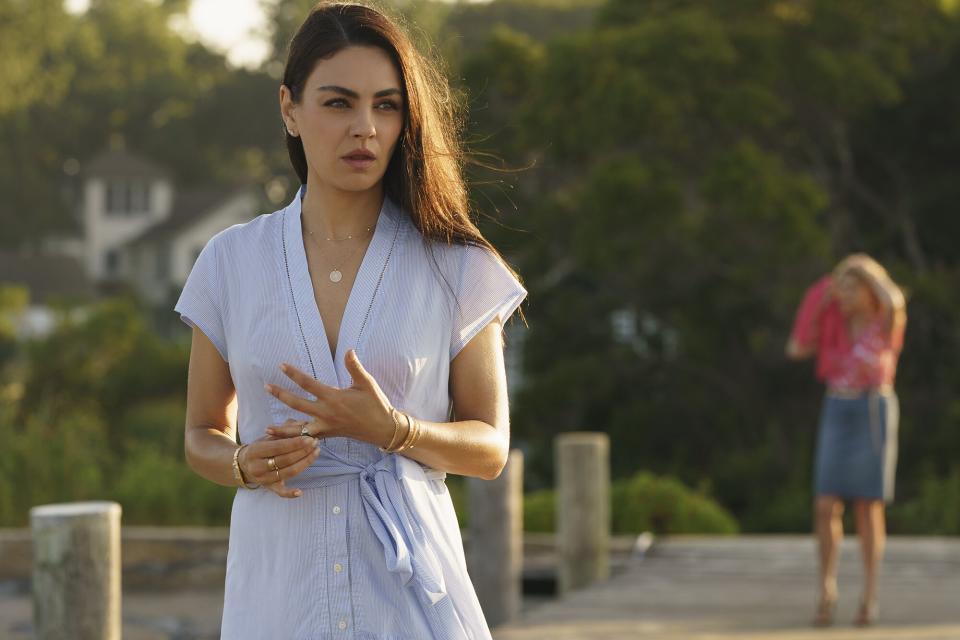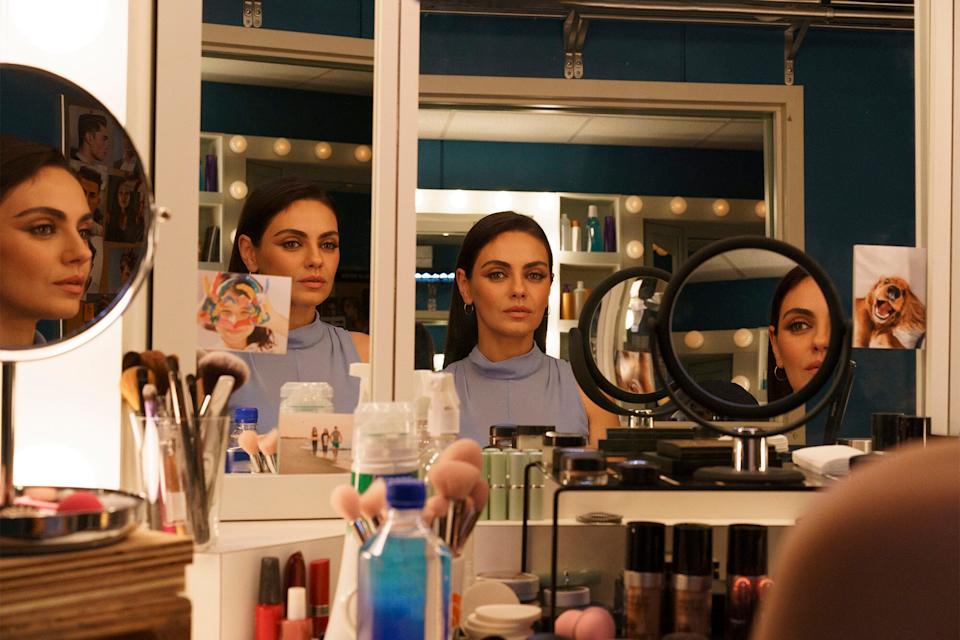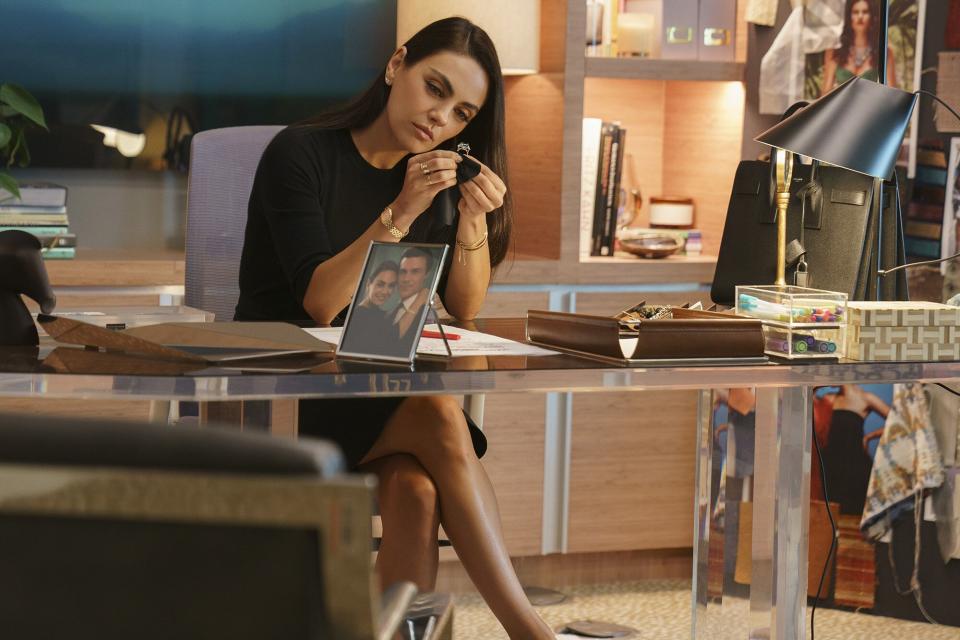How Mila Kunis helped Luckiest Girl Alive author create a 'powerful' — and polarizing — new ending for the movie
Warning: This article contains spoilers from the novel Luckiest Girl Alive.
When Jessica Knoll first wrote Luckiest Girl Alive in 2015, she never predicted it would become a Netflix movie starring Mila Kunis — and that the actor would actually help her re-shape the ending into something even more powerful than what she originally wrote.
Knoll's dark, twisted debut novel, about successful, twentysomething Ani Fanelli who is struggling to keep her past trauma buried, was an instant bestseller and went on to become the most successful debut of the year. But it wasn't until a year after the book's release that the author revealed the harrowing gang rape Ani went through as a teenager was actually based on her own traumatic experience when she was 15. "I always felt this burning need to get this story off my chest somehow, some way," Knoll tells EW. For more than a year, she struggled with putting the words to paper. "But one day, I just sat down and the voice of Ani Fanelli just poured out of me, and it was nonstop for the next eight months until the book was completed. I still think of it as like a fever dream, a fugue state I went into to write that book."

Sabrina Lantos/Netflix
Writing the book and then later sharing her real-life experience in an essay for Lena Dunham's Lenny Letter was cathartic. But the overwhelming response from people who read her words impacted Knoll in a way she didn't expect. "Once it was out in the world, and people are talking to you about it, and talking to you about their own experiences, and what it meant for them to read this story, what it meant for them in their own lives, I shifted into a place where I was like, 'Wow, this is so much bigger than me.'"
Knoll says it was a "comforting realization," especially after carrying a lot of shame about her past trauma for so long. "Because you're conditioned to not talk about it, and there's something really liberating to talk about it and to have people say, 'I'm glad you're talking about this, because I want to talk about it too,'" she says. "You just feel so free for the first time in your life, like you don't have anything to be ashamed of. It just made me feel a lot more connected to women, and I don't think we get a lot of connectivity in our world anymore."
That's why Knoll felt so strongly about being the one to adapt the novel into a movie — not the usual path for authors whose work gets optioned. And she had the perfect role model when it came to adapting her own novel into a screenplay. "The timing of everything was very serendipitous, because who I was looking to and hoping to become was what Gillian Flynn had done [with Gone Girl]," Knoll says of the Entertainment Weekly alum. "I saw something in her that I wanted to emulate — I'm coming from the magazine world too, now I've written a book, it's going to be optioned for film, why can't I also be the one to write it? Why not me?"
Knoll adds with a self-deprecating laugh, "A lot of it came down to the fact that I was incredibly cheap labor since I had never done this before. But I really felt that if you just give me the chance, I know I can prove myself. And I did." But it wasn't an easy process. "We'd been trying to get this made for seven years, there had been a lot of ups and downs with this project and we'd been talking about many different people [for the lead role]."

Sabrina Lantos/Netflix
Eventually Kunis was sent the script, and it unlocked a memory in her. "The title seemed familiar, so I googled it and realized that I had actually read the book years and years ago," Kunis tells EW. "Jessica's writing was so extraordinary, and her voice, as it's in the movie, is simply piercing, so saying yes to this was easy."
Casting Kunis was the secret ingredient Knoll had been searching for. "Once we got to set and I saw her performing these lines, that was when I really realized, 'Oh, my God, this could have so easily gone sideways if it was anybody else.' Not just anyone can do this," she says.
But it wasn't just Kunis' intense, biting-yet-vulnerable portrayal of Ani that helped Knoll successfully bring her story from the page to the screen. "When Mila came on, there were several conversations about how the ending wasn't quite landing," Knoll remembers. (The book ends after a key confession.) "At some point I do remember saying how when I wrote my essay for Lenny Letter that I was just inundated with messages from women sharing their stories, and that unlocked something in us where we were like, maybe there's a way to use that to shape our ending."
All those discussions led to Knoll pulling from her real-life experiences even further to craft an entirely new ending for the movie. "It's very meta that it's a fictional story, a fictional character, but there are even more elements that are inspired by my real life," Knoll says. "I like that we looked at the year that followed me writing the book and writing my essay and the reaction to it and going on a TV show to talk about it. I liked that we embedded that into the movie because I think it makes for a more epic journey that Ani goes on."
Both Knoll and Kunis were thrilled with the new ending, but when they showed the movie at test screenings, they were shocked that a lot of viewers didn't understand or even like the final scene. But they honestly didn't care because, to them, it was the "perfect" way to conclude Ani's story. "I know the ending is polarizing, which is what I think makes this movie so interesting," Kunis says. "It's not cookie cutter, and not everybody experiences this movie the same way. So many people had such a different experience while watching the same piece of content, including the ending. A lot of people didn't like it, but I fought so hard for it to stay in. I'm really glad that we won this fight because it's so powerful."

Sabrina Lantos/Netflix
But mining her own personal trauma for the project was never easy for Knoll, despite how far she was willing to go to bring this story to life the right way. "I chose not to be on set on the days that they filmed the assault," she says. "I didn't want the actors to feel uncomfortable with me there. I wanted them to feel like they could do their work, and they didn't have to also have this kind of extra layer of, the writer is here who's had this similar experience. 'She's watching, what is she thinking?' I didn't want to burden anyone with that."
Despite how difficult it got for her at times, Knoll never shied away from showing a true, authentic story about how rape can affect someone, because she knew it would help so many others who went through something similar. "I now see myself as someone who finally feels like I have agency in my life, and I don't know that I truly felt that way when I wrote the book, and even when I wrote my essay," she says. "I've done a lot of work to process what has happened to me to understand why I had to deal with it in the way I did, and today I can get on my own two feet, and I'm in a position to help people who are vulnerable the way I was once vulnerable, and that makes me feel like, at least in my own lifetime, there has been progress."
Kunis hopes the film helps people find their voice if they feel they've lost it, because she feels "empowered" to have always had hers throughout her life. "I don't know if I ever lost my voice," she says. "I've been really fortunate to have always been surrounded by people that had my best interest in mind from a very young age. I've always had a really great safety net. I've never had to worry about anything other than myself, selfishly. And I had incredible guidance. I was super fortunate. When people say, what advice would you give other people? I would say find an amazing mentor in your life that you trust, that you can talk to, who's opinion matters to you."
If there's even just one person who benefits from watching Luckiest Girl Alive, then Knoll feels she's done her job. "The biggest thing that surprised me with the book was hearing from so many women that, because of my essay or because of my book, they turned to their boyfriend or their husband or their girlfriend, and said for the first time, 'I had an experience, and I want to tell you about it, and I buried it, and I didn't talk about it for a long time,'" she says. "That is an incredibly powerful thing to be able to do, to be able to unburden yourself from something that a lot of people carry around for many years. If the movie were to have that same effect, but on the Netflix level of reaching so many more people, I would be really, really happy."
Luckiest Girl Alive debuts in select theaters Friday, Sept. 30 and streams on Netflix Oct. 7.
Sign up for Entertainment Weekly's free daily newsletter to get breaking TV news, exclusive first looks, recaps, reviews, interviews with your favorite stars, and more.
Related content:

